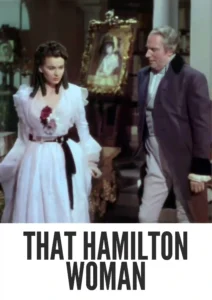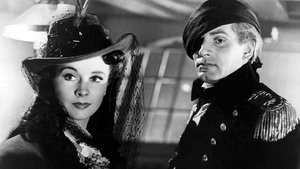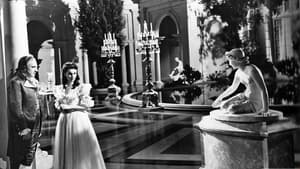Contact: info@alwanfilm.com
Video Sources 0 Views
- Watch trailer
- That Hamilton Woman 1941 Colorized


Synopsis
Table of Contents
ToggleThat Hamilton Woman 1941 Colorized Review: A Captivating Biographical Drama

Introduction
That Hamilton Woman (1941) is a fascinating biographical drama that brings to life the tumultuous love affair between the iconic British naval hero Admiral Horatio Nelson and the beautiful and spirited Emma Hamilton. Directed by Alexander Korda, this film features standout performances from its leading actors, Vivien Leigh and Laurence Olivier, who portray the legendary couple with undeniable chemistry. Not only does the film provide a glimpse into a significant historical period, but it also serves as a remarkable example of how films of the early 1940s tackled complex themes of love, loyalty, and sacrifice amid the backdrop of war. In this review, we will explore the film’s plot, characters, artistic elements, and its lasting legacy in the context of cinema history.
Check The Full Colorized Movies List
Check Our Colorized Movies Trailer Channel
Understanding That Hamilton Woman 1941 Colorized: Director, Cast, and Genre
Director’s Vision
Alexander Korda, a prominent figure in British cinema, was known for his grand storytelling and visual flair. In That Hamilton Woman, Korda’s vision is evident in his careful attention to detail, historical accuracy, and the rich emotional depth of the characters. He skillfully balances the film’s romantic elements with the broader socio-political context of the Napoleonic Wars, creating a narrative that resonates with audiences on multiple levels.
The Iconic Performance of Actors
Vivien Leigh and Laurence Olivier deliver unforgettable performances as Emma Hamilton and Admiral Horatio Nelson, respectively. Leigh’s portrayal of Emma is both vibrant and poignant, capturing her unwavering devotion to Nelson and the personal sacrifices she makes throughout their tumultuous relationship. Leigh’s ability to convey the complexities of her character, from her passion to her heartbreak, is a testament to her acting prowess.
Laurence Olivier’s portrayal of Nelson adds depth to the film, as he embodies the heroic yet troubled figure with grace and intensity. Olivier captures Nelson’s charisma, leadership, and the tragic consequences of his dedication to duty, making his character both admirable and relatable.
Exploring the Genre
That Hamilton Woman (1941) falls into the biographical drama genre, which is characterized by its focus on real-life figures and events while dramatizing their stories for entertainment and emotional impact. The film intertwines romance and historical drama, showcasing the personal and public struggles of its characters. Korda’s blend of grand historical storytelling with intimate character development sets this film apart from typical biographical narratives of its time.
Exploring the World of That Hamilton Woman 1941 Colorized: Plot and Characters
Detailed Synopsis
That Hamilton Woman opens with Emma Hamilton, a young woman with dreams of a glamorous life, who becomes the muse of the influential artist George Romney. Emma’s charm and beauty catch the eye of Lord Nelson (Olivier), a rising naval officer who is both ambitious and deeply committed to his country.
As their relationship blossoms, the backdrop of the Napoleonic Wars becomes increasingly significant. Nelson’s career flourishes as he earns fame and accolades for his naval victories, but his dedication to duty often comes at the expense of his personal life. The film poignantly portrays the couple’s passionate love affair, marked by joyful reunions and heart-wrenching separations as Nelson is called to the front lines.
The film explores themes of loyalty, love, and sacrifice, showcasing Emma’s unwavering support for Nelson, even as his fame grows and the dangers of war loom ever closer. As tensions rise in Europe, the film culminates in the iconic Battle of Trafalgar, where Nelson meets his tragic fate, forcing Emma to confront the harsh realities of love and loss.
The Complex Protagonist and Memorable Supporting Characters
Emma Hamilton is portrayed as a multifaceted character whose ambitions and desires evolve throughout the film. Her initial aspirations of wealth and social status are overshadowed by her deep love for Nelson and the sacrifices she makes for him. The film also features supporting characters, such as Lord Hamilton, Emma’s husband, and other prominent figures of the time, who add layers to the narrative and help illuminate the societal norms and pressures that influence Emma’s choices.
The Art of Historical Representation
Understanding Historical Accuracy
That Hamilton Woman effectively weaves historical accuracy with dramatic storytelling. While the film takes creative liberties, it captures the essence of the real-life figures and events surrounding Nelson and Emma. The attention to detail in the film’s costumes, settings, and dialogue reflects the era’s nuances, providing audiences with an immersive experience that highlights the complexities of 18th-century British society.
Early Color and Cinematic Techniques
The Use of Technicolor
While That Hamilton Woman (1941) is predominantly known for its black-and-white cinematography, it is worth noting the emerging trends in film technology during this period. The film, however, was shot with a focus on dramatic lighting and shadow, emphasizing the emotional depth of the characters rather than relying on the vibrancy of color. This approach aligns with the film’s themes of love and sacrifice, creating a somber yet captivating visual experience.
Korda’s Cinematic Techniques
Korda’s direction employs various cinematic techniques that enhance the storytelling. From sweeping shots of naval battles to intimate close-ups of emotional moments, Korda creates a dynamic visual narrative that draws viewers into the lives of his characters. The interplay between light and shadow adds to the film’s dramatic tension, effectively portraying the inner turmoil of the characters amidst external conflict.
The Impact of That Hamilton Woman 1941 Colorized
The Legacy of the Film
That Hamilton Woman (1941) has left a lasting legacy in the realm of biographical dramas. The film not only highlights the romanticized portrayal of historical figures but also serves as a commentary on the sacrifices made in the name of love and duty. It exemplifies how cinema can explore the depths of human emotion while remaining rooted in historical context.
The Film’s Influence on Future Biographical Dramas
The film’s successful blend of romance, drama, and historical narrative paved the way for future biographical films. Its exploration of complex relationships and the intertwining of personal and historical events influenced filmmakers for decades to come. The enduring popularity of biopics today can be traced back to films like That Hamilton Woman, which set a precedent for how such stories could be told.
Themes Explored in That Hamilton Woman 1941 Colorized
Love, Sacrifice, and Duty
At its core, That Hamilton Woman examines the themes of love, sacrifice, and duty. Emma’s devotion to Nelson, despite the societal constraints and personal hardships she faces, underscores the power of love to transcend obstacles. The film explores how both characters are torn between their personal desires and their responsibilities to their country and society.
The sacrifices made by both Emma and Nelson are poignantly depicted throughout the film, illustrating the complexities of love during times of war. Emma’s unwavering support for Nelson, even as he faces perilous battles, highlights the strength of their bond and the personal cost of ambition.
Reception and Controversy Surrounding That Hamilton Woman 1941 Colorized
Initial Reviews and Audience Reactions
Upon its release, That Hamilton Woman received critical acclaim for its performances, particularly those of Leigh and Olivier. Critics praised the film’s emotional depth and the chemistry between the lead actors, noting how their performances brought the historical figures to life. The film resonated with audiences, who were captivated by the tragic love story set against the backdrop of significant historical events.
However, the film’s romanticized portrayal of historical figures did draw some criticism from historians and critics who felt that it glossed over the complexities of the real-life events and characters. The blend of fact and fiction sparked discussions about the responsibilities of filmmakers when depicting historical narratives.
Where to Watch That Hamilton Woman 1941 Colorized Online
For those interested in experiencing That Hamilton Woman (1941), the film is available on various streaming platforms, including Amazon Prime Video and Turner Classic Movies. Additionally, DVD and Blu-ray versions of the film can be purchased, offering viewers the opportunity to explore this captivating story at home.
FAQs About That Hamilton Woman 1941 Colorized
Q: What is the significance of That Hamilton Woman (1941)?
A: That Hamilton Woman is significant for its portrayal of a complex historical relationship and its exploration of themes of love and sacrifice amidst the backdrop of war. The film showcases the talents of Vivien Leigh and Laurence Olivier, solidifying their status as iconic actors.
Q: Who directed That Hamilton Woman (1941)?
A: The film was directed by Alexander Korda, a prominent figure in British cinema known for his grand storytelling and innovative filmmaking techniques.
Q: What themes are explored in That Hamilton Woman (1941)?
A: The film explores themes of love, sacrifice, and duty, highlighting the challenges faced by Emma Hamilton and Admiral Nelson in their tumultuous relationship during a time of war.
Q: How has That Hamilton Woman (1941) influenced future biographical films?
A: The film has had a lasting impact on the biographical drama genre, demonstrating how personal and historical narratives can be intertwined to create emotionally resonant stories. Its success paved the way for future biopics that explore complex relationships against historical backdrops.
Conclusion
That Hamilton Woman (1941) stands as a remarkable achievement in biographical cinema, blending romance, history, and drama to create an unforgettable narrative. Alexander Korda’s direction, combined with the powerful performances of Vivien Leigh and Laurence Olivier, brings the tragic love story of Emma Hamilton and Admiral Nelson to life with emotional depth and historical significance. As audiences continue to explore this classic film, its themes of love, sacrifice, and duty remain relevant, ensuring that That Hamilton Woman will continue to captivate viewers for generations to come.












